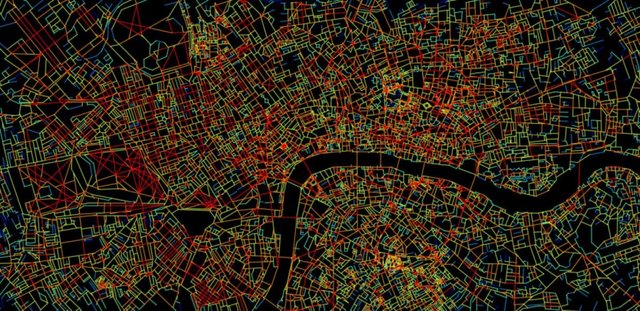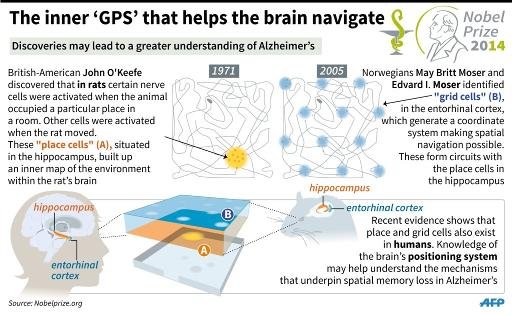New Study: Relying On GPS Navigation Switches Off Your Brain's Inner GPS!

Most people nowadays rely on the GPS on their phones or in their cars to take them anywhere.
No doubt, it's an amazing invention - wherever you are, foreign city or not, you can simple type in where you want to go and you'll always know the way, without getting lost.
As great as that sounds, scientists have found out that using your phone's GPS is actually switching of the GPS in your brain.
Our inner GPS is a very complex system of specialized nerve cells.
It's located in our Hippocampus, the region of the brain that manages future plans, memories and more.
With this system, we're able to plan, memorize and simulate routes, and be aware of our location in a 3D environment.
The study from the University College London, published in "Nature Communications" 2 days ago, tested the navigation skills of 24 volunteers.
At first, the volunteers were taken on a 2 hour tour through Soho in central London, and shown 23 different goal locations.
The next day, the participants were then shown a simulation of SoHo in London, and were told to navigate to the goal locations while their brain activities were being scanned.
Whenever the test subjects were entering new streets or crossroads, the scientists registered a spike in brain activity in the hippocampus and prefrontal cortex.
When there were several options to choose from, for example a crossroad or a large streets from which many small streets go off, the brain activity would be significantly higher.
When they would run into a dead end, the activity would decrease.
But as the participants were following directions from the GPS on their smartphone, their brain activity hardly increased at all!
And not only that - the study even showed that when simply receiving instructions, the parts of our brain that would normally manage and simulate the navigation switch off - making it even easier to get lost.

"Entering a junction such as Seven Dials in London, where seven streets meet, would enhance activity in the hippocampus, whereas a dead-end would drive down its activity. If you are having a hard time navigating the mass of streets in a city, you are likely putting high demands on your hippocampus and prefrontal cortex. Our results fit with models in which the hippocampus simulates journeys on future possible paths while the prefrontal cortex helps us to plan which ones will get us to our destination. When we have technology telling us which way to go, however, these parts of the brain simply don't respond to the street network. In that sense our brain has switched off its interest in the streets around us."-Senior Author Dr Hugo Spiers, University College London - Experimental Psychology
Previous studies from the University College of London had shown that the hippocampi of taxi drivers even expanded as they were learning to navigate through london and memorize the streets and landmarks.
But when drivers only follow their navigation system's directions, they hardly memorize any of the street networks they're driving through.

By following GPS directions only, your brain's inner GPS isn't active - you're simply carrying out orders. You won't simulate new routes, memorize the streets or learn anything about your environment.
So over-reliance on GPS systems can make you struggle more if you actually have to navigate manually from time to time!
Images: 1, 2, 3, Sources: 1, 2, 3, 4
- Instagram -

© Sirwinchester
One of the most effective ways that I've found to use your brains GPS is to take mental screenshots when traveling. It's pretty cool to do because your brain will start to build a map on it's own using a combo of visuals, memory, and sense of direction.
Very interesting! Thanks for sharing!
funny to see this study confirm what I already believed from experience. It's like you become a slave to the GPS and your brain shuts down. I often found I'd get lost more easily and more often even driving routes I'm already familiar with. Uhhh, ok, turn right here, oh shoot, how'd I still manage to miss that?! But if I would just conceptualize in advance how to get there, I wouldn't even need the GPS and almost never missed a turnoff. lol
Very true.
Obviously when you're in a foreign city a GPS is great, but it doesn't help at all when actually trying to learn and memorize your surroundings!
GOOD LUCK.!!!
@sirwinchester
Thank you
You are welcome
Great post!
This is totally true, unfortunately. And the conclusions can, in my opinion, be extended to many other cases (although this relies on my opinion on not on any scientific ground): people like to rely on technology, and we end up with a situation where technology thinks for us. And without being trained to think, ...
Yes I agree. Technology is amazing, no doubt, but sometimes it can backfire if we rely on it too much and forget how to do things without it.
Talking about "keeping the balance" with technology, just in case you haven't seen this one... lol
Link: Is Virtual Reality Destined to Become Techno-Hell on Earth?
I fully agree with you!
Your absolutely right it's right up there with watching t.v., Which people intend to do more of instead of reading a book. Since the GPS is doing all the work for you your brain is just gonna take a day off as if your watching t.v. well mostly un-educated program at least.
Sometimes i ask myself if not all the techology swich off our brain? We are very smart now but why, because of technology, if all the electricity will be shut down how our brain will be. I love technology i am a gadget boy but sometimes i just ask if...?.